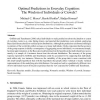Free Online Productivity Tools
i2Speak
i2Symbol
i2OCR
iTex2Img
iWeb2Print
iWeb2Shot
i2Type
iPdf2Split
iPdf2Merge
i2Bopomofo
i2Arabic
i2Style
i2Image
i2PDF
iLatex2Rtf
Sci2ools
COGSCI
2008
2008
Optimal Predictions in Everyday Cognition: The Wisdom of Individuals or Crowds?
Griffiths and Tenenbaum (2006) asked individuals to make predictions about the duration or extent of everyday events (e.g., cake baking times), and reported that predictions were optimal, employing Bayesian inference based on veridical prior distributions. Although the predictions conformed strikingly to statistics of the world, they reflect averages over many individuals. On the conjecture that the accuracy of the group response is chiefly a consequence of aggregating across individuals, we constructed simple, heuristic approximations to the Bayesian model premised on the hypothesis that individuals have access merely to a sample of k instances drawn from the relevant distribution. The accuracy of the group response reported by Griffiths and Tenenbaum could be accounted for by supposing that individuals each utilize only two instances. Moreover, the variability of the group data is more consistent with this small-sample hypothesis than with the hypothesis that people utilize veridica...
| Added | 09 Dec 2010 |
| Updated | 09 Dec 2010 |
| Type | Journal |
| Year | 2008 |
| Where | COGSCI |
| Authors | Michael C. Mozer, Harold Pashler, Hadjar Homaei |
Comments (0)

